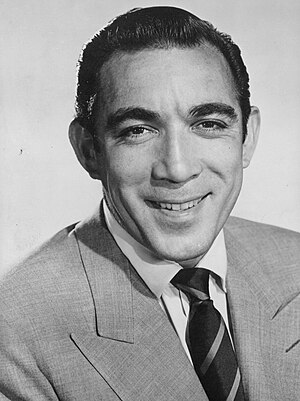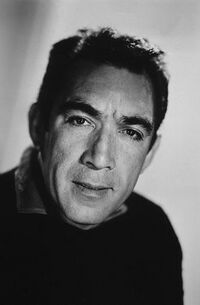Anthony Quinn
Relevance
Mentioned In
Wikipedia Information
 |
Manuel Antonio Rodolfo Quinn Oaxaca (April 21, 1915 – June 3, 2001), known as Anthony Quinn, was an American actor. He was known for his portrayal of earthy, passionate characters "marked by a brutal and elemental virility" in over 100 film, television and stage roles between 1936 and 2002. He was a two-time Academy Award winner, and was also nominated for five Golden Globe Awards, two BAFTA Awards and a Tony Award. Quinn was born in Chihuahua City, Mexico, and was raised in El Paso, Texas and East Los Angeles. After stints as a boxer and an architect, he made his film debut in the Cecil B. DeMille Western The Plainsman in 1936. Initially typecast as a “heavy” and playing other minor parts as well, he was gradually cast in more substantial parts, including co-starring roles in Blood and Sand (1941) and The Ox-Bow Incident (1943). He won his first Oscar, for Best Supporting Actor, for his portrayal of Eufemio Zapata in Viva Zapata! (1952), becoming the first Mexican-born performer to win an Academy Award. He received his second Oscar in 1957 for Lust for Life. He would be nominated for Best Actor twice more, for his roles in Wild is the Wind (1958) and Zorba the Greek (1964). His other notable films included La Strada (1954), The Guns of Navarone (1961), Requiem for a Heavyweight (1962), Lawrence of Arabia (1962), Guns for San Sebastian (1968), The Shoes of the Fisherman (1968), Across 110th Street (1972), The Message (1976), Lion of the Desert (1980), Jungle Fever (1991) and Seven Servants (1996). He also starred in the Broadway plays A Streetcar Named Desire (replacing Marlon Brando), Becket (earning a Tony nomination for Best Actor in a Play), and Zorba (reprising his film role). Aside from his acting career, Quinn was also a civil rights activist, an avid painter, and the author of several autobiographical books. In 1987, he was presented with the Golden Globe Cecil B. DeMille Lifetime Achievement Award. Through both his artistic endeavors and activism, he is considered a seminal figure of Latin-American representation in the media of the United States.
